Thousands of Alabamians attended protests around the state Saturday against President Donald Trump and his administration.
About 15 protests were scheduled around Alabama, part of over 2,600 demonstrations scheduled on Saturday that were expected to draw millions of people. Crowd sizes varied, from about 40 people in Selma to up to 2,000 in Birmingham.
Speakers and participants criticized the administration’s seizure of power; its arrest and detention of immigrants and its policies toward health care. Others said Trump administration policies were hurting members of their families.
The protests were largely peaceful, with no major incidents reported.
A similar round of protests were held in June and drew millions of people to 1,500 sites nationwide. About 14 of those protests were held in Alabama that day with thousands of people in attendance.
More than 600 people gathered in downtown Montgomery for the city’s “No Kings” rally.
“The kind of change that we are trying to achieve is not the kind of change that happens fast,” said Tabitha Isner, vice chair of the Alabama Democratic Party, who spoke at the rally. “This is the kind of change that requires we keep showing up. The last time we showed up, we were a good, decent crowd, but this time we are bigger. The next time we show up, we will be even bigger.”
The protest, which began at Riverfront Park, featured people dressed in makeshift costumes displaying dinosaurs and squirrels and others who adorned themselves with colors of the rainbow. Many carried cardboard placards replete with crowns that were crossed out with the words “No Kings” on them.
At 9 a.m. the crowd then marched a quarter mile to the Court Square Fountain, a site where enslaved people were bought and sold prior to the Civil War, to hear from speakers who urged them to continue the public outcry, and who criticized nearly every aspect of Trump’s policies, from mass arrest and deportations of immigrants to tariffs on trade, as well as the budget bill that Congress passed at Trump’s urging that cut funding for social service programs.
“No king, no crowns, no thrones, only love, because violence is not just bullets and bombs,” said Rev. Valtoria Jackson, Montgomery lead organizer for the Alabama Poor People’s Campaign, said in a speech. “Violence is when people cannot afford a house, violence is when a voter cannot afford medicine, violence is when mothers continue to lose sons and daughters to greed and guns. Violence is when the rich get tax breaks and the poor get evicted.”
Jackson has spoken at numerous gatherings before to raise awareness of the budget bill recently passed by Congress and the potential expiration of expanded tax credits for Affordable Care Act plans that could drive up insurance costs around the nation. The loss of those credits has been a major reason for the ongoing federal government shutdown. The budget bill also reduced funding for Medicaid and the Supplemental Nutrition Assistance Program that provides food subsidies to lower-income families and individuals. The bill passes more of the cost of maintaining the programs to the states, and advocates had been warning that the bill could reduce the state’s economy by more than $1 billion and eliminate health insurance coverage for almost 200,000 people.
“Our food pantry participation has gone up 200% since he passed this bill,” said Rev. Manuel Williams in an interview following the event, pastor at Resurrection Catholic Church in Montgomery. “These are people who never had to come and get food assistance, but now they are food insecure.”
Others voiced strong opposition to the administration’s efforts to deport large numbers of immigrants living in the U.S.
“One of my biggest things is the ICE (Immigration and Customs Enforcement) raids, the deportation of people who are just trying to live,” said Haley Morgan, who attended the protest. “They are getting deported for a taillight being out, or for speeding. If that is the case, deport me because I have sped and my taillight has been out.”
Many of those who gathered also expressed reservations about Trump’s efforts to reshape the federal government.
“I wanted to help protest against all that Trump is doing,” said Judy May, 87, who attended the rally. “He is destroying the constitution. He is trying to take away our right to vote, our rights of free speech. He is firing so many people, taking so many important departments to pieces. He is destroying the Department of Education, he has destroyed the public health department, I just hate everything he is doing.”
Laurie Kelly and her husband, who live in Chicago, were traveling to the Gulf of Mexico for a beach vacation. Kelly said she asked her husband to find somewhere to stop to protest.
“If we don’t show up, it’s over. This is very important. It’s small, but it’s still here and that does matter,” Kelly said in an interview. “People need to stand up. That’s what I’m trying to do. It’s all I can do.”
The couple joined about 40 people gathered at the foot of the Edmund Pettus Bridge in Selma Saturday afternoon for a local No Kings protest.
The Selma protest was the second for some. Jasie Shepard and Dr. Justin Cavanaugh traveled to Selma after the Tuscaloosa No Kings protest ended Saturday morning, about a 90-minute drive.
Nate Bradley and his friends came to Selma after the Montgomery protest ended this morning. He said he is protesting because of President Donald Trump’s disregard of Congress’ power of the purse.
“Now we have a president who says, ‘I’m not going to fund Democrat programs.’ What does that mean?” Bradley said. “He wouldn’t be able to articulate a thought about that. It’s insulting.”
Bradley said the protests in Montgomery and Selma gave him hope.
“I call my representatives, I go to my townhalls,” Bradley said of what he does outside of the No Kings protests. “I just try to stay sane and find a balance between staying sane and keeping up to date with the nonstop deluge of things that this administration is doing or not doing.”
Annie Pearl Avery, a long-time civil rights activist, urged people to protest every day.
“It’s not going to be a lot of show and a lot of talk. There’s going to have to be some action,” Avery said. “You’ve got a purpose. Everyone has a purpose.”
Rev. Leodis Strong, lead pastor at Brown Chapel in Selma, criticized Republicans who claim to be Christian, but do not show it in policies.
“How can you call yourself pro-life when you did not give access to insurance to soon-to-be mothers and soon-to-be children outside the womb? How can you call yourself pro-life when you take away WIC and SNAP?” Strong asked. “That is a polluted religion.”
Jennifer Wright, who recently moved to Selma from Huntsville, criticized Congress for not releasing investigative files related to the late sex offender Jeffrey Epstein. She urged people to write letters and call their representatives. She also wrote a thank you letter to U.S. Rep. Thomas Massie, R-Kentucky, for his petition to release the files.
“Every member of Congress should have happily signed your petition because child sex trafficking should not be considered a partisan issue and should be considered a crime by everyone,” Massie read.
The petition was one vote short of the 218 it needed to pass in September.
Azali Fortier, 18, said the protest gave her a glimpse of hope.
“I know that they can see us because we can see each other,” Fortier said of the Trump administration and Congress. “We’re about to undergo a big change, either for better or for worse.”
The protest wrapped up with Yomi Goodall leading the group singing “America the Beautiful” and “We Shall Overcome,” a Civil Rights Movement anthem.
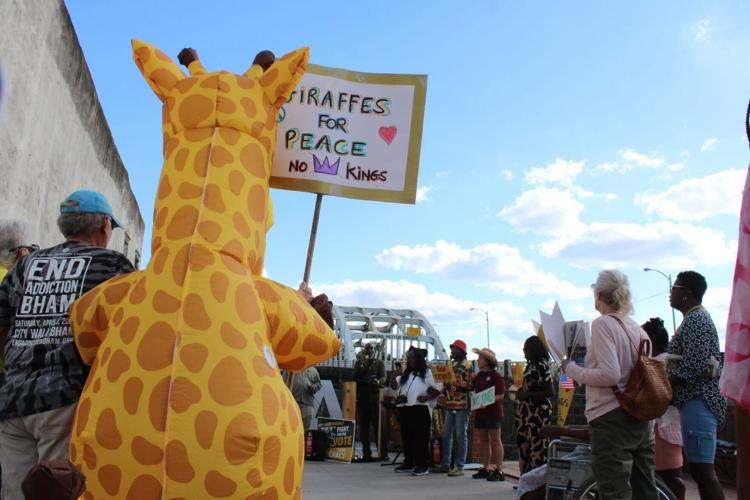
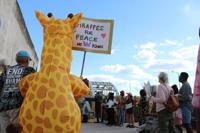
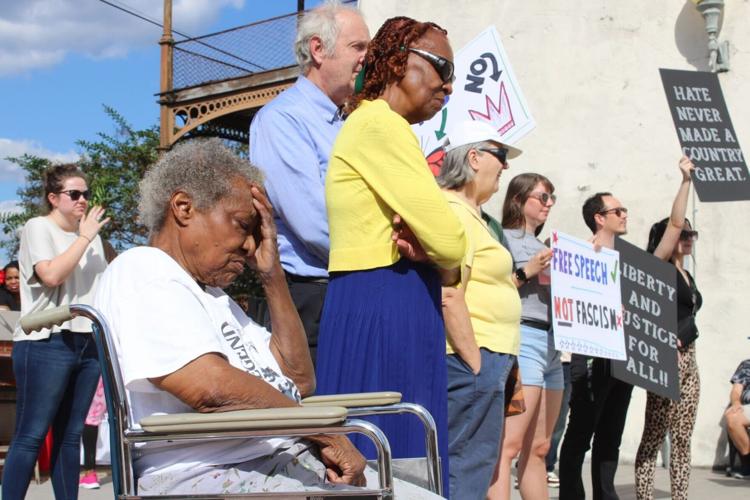
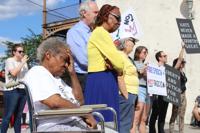
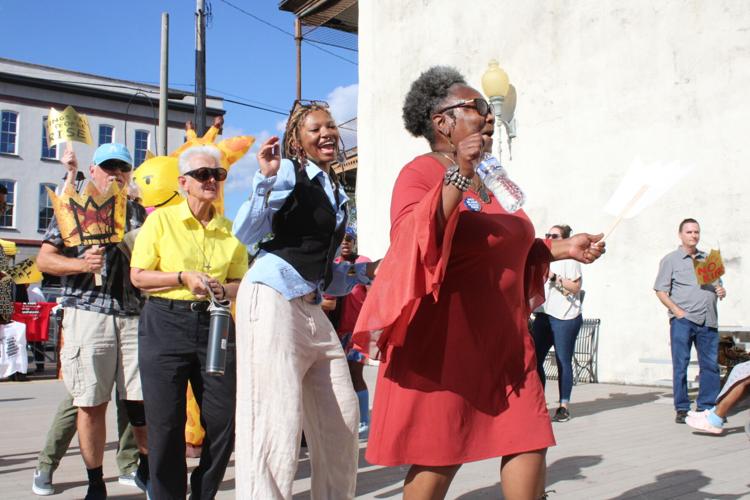
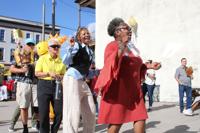
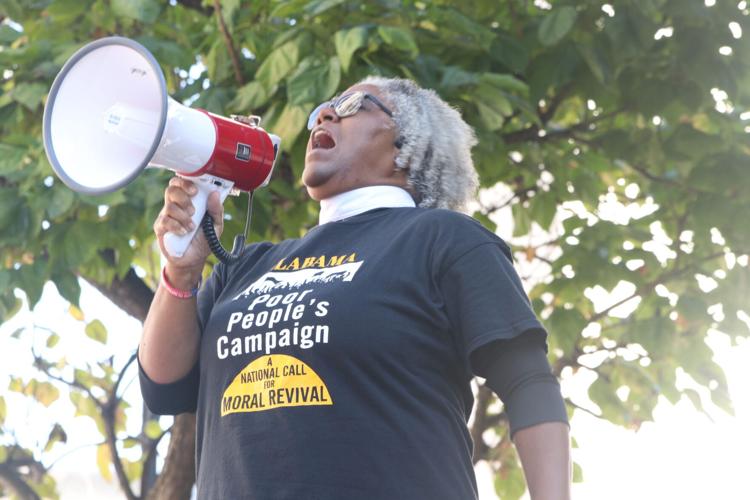
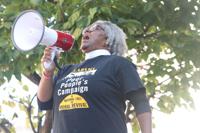

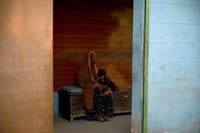

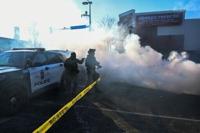










(0) comments
Welcome to the discussion.
Log In
Keep it Clean. Please avoid obscene, vulgar, lewd, racist or sexually-oriented language.
PLEASE TURN OFF YOUR CAPS LOCK.
Don't Threaten. Threats of harming another person will not be tolerated.
Be Truthful. Don't knowingly lie about anyone or anything.
Be Nice. No racism, sexism or any sort of -ism that is degrading to another person.
Be Proactive. Use the 'Report' link on each comment to let us know of abusive posts.
Share with Us. We'd love to hear eyewitness accounts, the history behind an article.